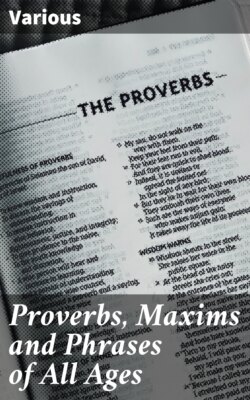Читать книгу Proverbs, Maxims and Phrases of All Ages - Various - Страница 4
На сайте Литреса книга снята с продажи.
PREFACE.
ОглавлениеTable of Contents
The compiler does not venture to claim for his work either completeness or perfection; he hopes, however, that it may be found, what he has conscientiously endeavored to make it, useful and instructive.
In offering a book to the world of letters, it is fair to assume that the author, or as in this case the compiler, claims for it a right to exist on the ground of superiority in some particulars over existing works in the same department of literature.
The great value as instructors, of inspired and uninspired proverbs has long been recognized.
“The people's voice, the voice of God we call,
And what are proverbs but the public voice?
Coined first and common made by common choice,
Then sure they must have weight and truth withal.”
It may be safely affirmed of all notable collections of proverbs hitherto published, that they include very many tainted with impurity, and others, the wit of which does not redeem their coarseness. All such have been excluded from the present compilation. Even the learned Ray marred his celebrated work, that great storehouse of proverbs liberally drawn upon by succeeding collectors, by admitting “a mass of revolting coarseness”—“ineffectually veiled by putting initial letters for uncleanly words.”
Proverbs merely local, or consisting of allusions of a temporary character, or to individuals not historic were not deemed worthy of insertion.
So far as the compiler's researches have extended he has found no considerable collection of proverbs, English or foreign, that was not arranged alphabetically,—a perplexing labyrinth without a clew; so that in order to find a desired proverb it was necessary to know the initial words, at least; the topical arrangement of the present work, it is believed, overcomes this difficulty as far as may be practicable.
The compiler lays claim simply to industry in gathering, taste in selecting and patience in arranging his collections; but feels also some pride in having brought to the notice of the modern reader many literary gems that lay buried in the writings of once famous but now forgotten or neglected authors.
All available collections have been laid under contribution, and due credit to the same is given in the body of the work.
The London Punch has been freely preyed upon. Punch the inimitable, whose wit if sometimes severe is never impure. Any careful reader of Punch has not failed to observe his liberal use of proverbs. Some of the most delightful pleasantries of Punch are grave proverbs masquerading in merry attire; for example, the Chinese proverb, “Patience, and the mulberry leaf becomes a silk gown,” is humorously transformed into, “Patients, patients, and the physician's pill-box become a brougham.”
The reader will find that Blackwood's Edinburgh Magazine stored with literary jewels of all kinds, has also been frequently referred to.
The Tamil proverbs were taken from the collection numbering more than six thousand, translated by P. Percival.
The compiler had no hesitation in giving credit to Shakespeare for the numerous felicitous sayings selected from the dramas that bear his name, confident that one who had disgracefully deserted his benefactor living, and basely defamed him dead, could not and would not have written such lines as these,
“I hate ingratitude more in a man,
Than lying, vainness, babbling, drunkenness,
Or any taint of vice whose strong corruptions
Inhabit our frail blood.”
A dishonored lord chancellor would never have perpetuated his self-confessed infamy in immortal verse,
“In the corrupted currents of this world,
Offence's gilded hand may shove by justice;
And oft 'tis seen the wicked prize itself
Buys out the law.”
The compiler may have brought himself within the condemnation of a well-known proverb, by admitting into his work, so many proverbs fiercely denouncing his own profession, the law. If the censures are baseless,—they are harmless; if well founded, the profession should amend itself.
None are so severe however as the recent published utterances of the eloquent modern Pagan. “The lawyer is merely a sort of intelligent strumpet; a burglar in the realm of mentality.”
The ancient Pagan is less severe: he contents himself with saying of the lawyers of his day “Iras et verba locant.”
But “Law has her seat in the bosom of God, her voice is the harmony of the world;” if her disciples guide their footsteps by this noble sentiment, they will regain the confidence and respect of the world, if they have ever lost it.
Many proverbs cruelly unjust to woman will be found, which the compiler did not feel at liberty to exclude. To the poison of these, other proverbs furnish the antidote, “What cares lofty Diana for the barking dog;”—“Slander, foulest whelp of sin, expires at a good woman's door.” None of these however are nearly so atrocious as those to be found in “The Hitopadesa,” translated from the Sanskrit by Charles Wilkins. The following, which is much less severe than many others, will serve as an example. “In infancy the father should guard her, in youth her husband, in old age her children, for at no time is a woman proper to be trusted with liberty.”
However “as the people, so the proverb.”
WASHINGTON,
April 11, 1888.
| PREFACE. |
| LIST OF ABBREVIATIONS. |
| VOLUME I. |
| VOLUME II. |
| INDEX. |
| A. | B. | C. | D. | E. | F. | G. | H. | I. | J. | K. | L. | M. | |
| N. | O. | P. | Q. | R. | S. | T. | U. | V. | W. | X. | Y. | Z. |
